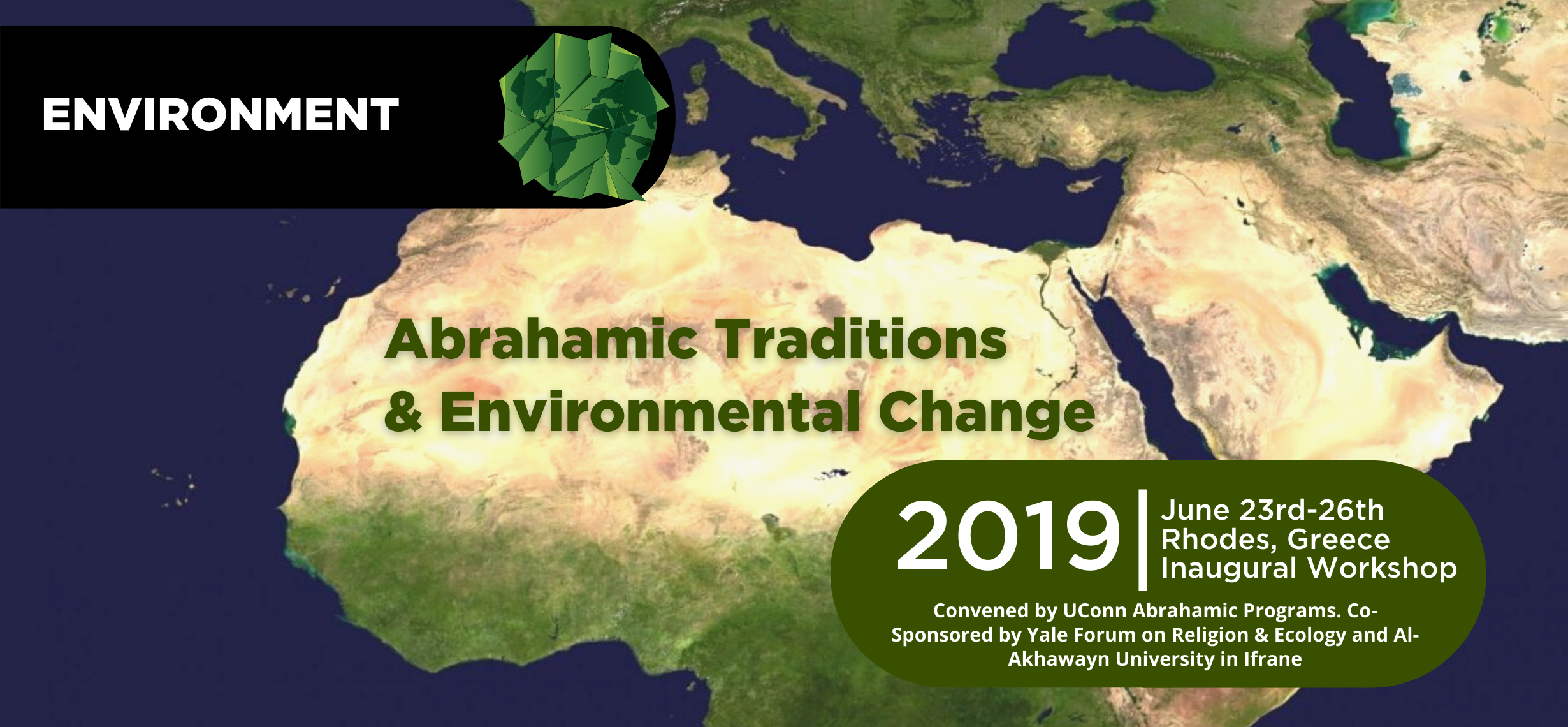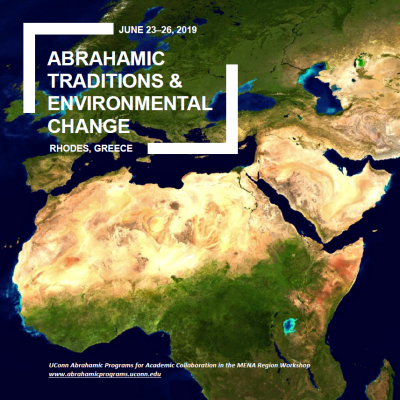
Abrahamic Traditions & Environmental Change Workshop
June 23-27, 2019 | Rhodes, Greece
Taken together, the three Abrahamic traditions include nearly half of the world’s population. These religions, have particular claims to ‘truth,’ which have sometimes led to past conflicts. Yet they share common cosmologies and ethics and provide many similar teachings in their respective sacred texts. They have each developed particular worldviews regarding the value and meaning of life. However, to a large extent they have comparable doctrinal and normative teachings: a belief in one God beyond the known and the observable; a commitment to social justice; and a sense of wonderment towards the universe and Earth, among others.
The Abrahamic religions have exhibited shared sensibilities of global awareness and responsibility and have worked as inspired catalysts for social change. The history of Judaism, Christianity and Islam indicate clearly that these traditions have consistently represented a genuine moral force, while exhibiting strong spiritual energy. Despite secularization and the one-sided criticism of their supposed outdated, ineffective ideologies, the Abrahamic religions remain foundational to how people of these faiths think, feel and act to this day.
Another important element that distinguishes the Abrahamic traditions from other religious ones: all three originate from a similar ecological setting—the dry lands of southwestern Asia—a fact that functionally contributed, at least in the early times, to shaping the human-environment relationship and patterns of interaction.
Current environmental challenges in the Middle East/North Africa (MENA) Region and beyond suggest an urgent need for cross disciplinary debate and understanding of the causes and consequences of environmental change as a prelude to successful mitigation and adaptation. Thus, one of the main tasks of this workshop is to explore how the Abrahamic traditions impact the ways in which humans perceive and interact with nature and the potential to translate those perceptions and interactions into positive social and ecological action. More than twenty years ago Harvard University’s Center for the Study of World Religions initiated multiple conferences on issues pertaining to religion and ecology that resulted in the publication of 10 seminal books between 1996 and 1998. Today, the Forum on Religion and Ecology (fore.yale.edu) at Yale University continues this work and is “the largest international multi-religious project of its kind” aiming at broadening understanding of the relationships between religious worldviews and environmental issues, in part by promoting scientific dialogue between the fields related to religious studies and other academic disciplines.
This Abrahamic Traditions and Environmental Change workshop builds on these past and present academic conversations with the aim of looking for a means through which the three Abrahamic faiths can help understand and counteract contemporary environmental change in the MENA region. It is also our intention to initiate a relevant, scalable and sustainable collaborative program between MENA scholars & practitioners and their North American and European partners.
Bringing People Together
Watch the video on Youtube for closed captioning.
Proceedings
Abrahamic Traditions & Environmental Change 2019 Workshop Proceedings
The 2019 workshop proceedings document includes a detailed agenda of the workshop, speaker abstracts, a summary of each session's discussion, and participants' biographies, as well as the working papers that resulted from the workshop.
View full interviews with participants below.
Working Papers
Judaic, Christian, and Islamic Perspectives on Shared Moral Principles
(Arabic Translation)
Authors: Jame Schaefer, Associate Professor, Department of Theology, Marquette University, Milwaukee, USA; İbrahim Özdemir, Visiting Professor of Philosophy, Åbo Akademi University, Turku, Finland; Jeremy Benstein, Director of Research & Publications, Heschel Center for Environmental Learning, Tel Aviv, Israel; Fazlun Khalid, Founder, Islamic Foundation for Ecology and Environmental Science, Birmingham, United Kingdom; and Nawal Ammar, Dean and Professor, College of Humanities & Social Science, Rowan University, Glassboro, USA
Citation: J. Schaefer, İ. Özdemir, J. Benstein, F. Khalid, and N. Ammar, “Judaic, Christian, and Islamic Perspectives on Shared Moral Principles,” paper commissioned at the Abrahamic Traditions and Environmental Change Workshop, Rhodes, Greece, 23-26 June 2019, sponsored by the Abrahamic Programs for Academic Collaboration in the MENA Region. August 2019. https://abrahamicprograms.uconn.edu/abrahamic_traditions_and_environmental_change.
MENA’s Common and Differentiated Environmental Challenges
Author: Alon Tal, Chair, Department of Public Policy, Tel Aviv University, Tel Aviv, Israel
Citation: A. Tal, “MENA’s Common and Differentiated Environmental Challenge,” Paper commissioned by the University of Connecticut, Abrahamic Programs for Academic Collaboration in the Middle East/North Africa Region, December 2019. https://abrahamicprograms.uconn.edu/abrahamic_traditions_and_environmental_change.
Environmental Challenges in the MENA Region
Author: Iyad Abumoghli, Director of UN Environment Program - Faith for Earth Initiative; and Adele Goncalves, Intern at UN Environment Program - Faith for Earth Initiative
This paper was written in response to a request by the University of Connecticut following the Abrahamic Traditions and Environmental Change Workshop, Rhodes, Greece, 23-26 June 2019, sponsored by the Abrahamic Programs for Academic Collaboration in the MENA Region.
Mapping Abrahamic Faith-Based Environmental Activities in the Middle East/North Africa Region
Authors: Adele Goncalves, Intern, UN Environment Program - Faith for Earth Initiative
This is the result of the commitments made between UNEP Faith for Earth and Uconn after the Abrahamic Traditions and Environmental Change Workshop, Rhodes, Greece, 23-26 June 2019, sponsored by the Abrahamic Programs for Academic Collaboration in the MENA Region. It is a collection of projects conducted by faith-based organizations in the Middle East and North Africa region. Here, some 40 projects, out of the 68 projects located, are introduced with their duration, objective, budget, activities, etc.
Conference Videos & Interviews
Daniel Weiner
Vice President for Global Affairs, University of Connecticut
John Grim
Co-Director of the Forum on Religion & Ecology, Yale University
Ebtesam Al Ketbi
President, Emirates Policy Center
Alon Tal
Chair, Department of Public Policy, Tel Aviv University
Kathryn Libal
Director, Human Rights Institute, University of Connecticut
Yossef Ben-Meir
President of Operations, High Atlas Foundation
Fazlun Khalid
Founder & Director, Islamic Foundation for Ecology & Environmental Science
Iyad Abumoghli
Director, Faith for Earth
Knut Næss
Science Communication Advisor, BI Norwegian Business School
Mary Evelyn Tucker
Co-Director of the Forum on Religion & Ecology, Yale University
Gidon Bromberg & Yana Abu Taleb
Tel Aviv & Amman Directors of EcoPeace Middle East
Adil Najam
Dean, Frederick S. Pardee School of Global Studies, Boston University
Nawal Ammar
Dean, College of Humanities & Social Science, Rowan University
Abdellatif Bencherifa
Professor of Public Policy, Universite Internationale de Rabat
Zhinan Chen
2nd Year Master's Candidate, Yale University
Jeremy Benstein
Director of Research & Publications, Heschel Center at Tel Aviv University
Jame Schaefer
Associate Professor of Systematic Theology, Marquette University
İbrahim Özdemir
Founding President, Hasan Kalyoncu University
Acknowledgements
This workshop is a joint venture between the University of Connecticut Office of Global Affairs, Al Akhawayn University, Morocco, and The Forum on Religion and Ecology at Yale University.
This workshop was made possible by the generous support of the Marsha Lilien Gladstein Foundation and the Cohen Family Fund.
Many thanks to Paideia Study Abroad in Greece (Storrs, CT), the University of the Aegean (Rhodes, Greece), the City of Rhodes and the Government of the South Aegean Islands for their hospitality and assistance with local arrangements.
